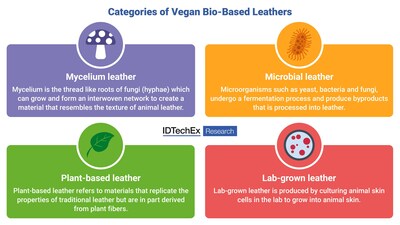Source prnewswire
Vegan Bio-based Leather: IDTechEx Discusses the Next Generation Materials Aiming to Displace Animal and Plastic Leather
In the past, there have been no serious competitors for animal leather and plastic leather (synthetic leather) until recently. Until now, there have been no serious competing materials. With the arrival of a new generation of bio-based alternatives, it will be possible to displace these incumbent materials with plastic-free, sustainable alternatives. IDTechEx's brand new market report, "Vegan Bio-Based Leather 2024-2034: Technologies, Trends, Players", provides a comprehensive overview of leather alternatives, technologies, market players, and trends.In your opinion, what are the major issues associated with the current leather materials? In accordance with the UN, animal farming contributes to a significant amount of greenhouse gas emissions. Approximately 10-20% of total greenhouse gas emissions are attributed to animal cultivation. In order to achieve sustainable materials without using animal products, consumers are increasingly demanding these products. This is driven by increasing awareness of the environmental impact of animal leather as well as vegan movements that reject the use of animals at all costs.To date, the only alternative that has been marketed as a vegan leather alternative has been plastic leather, which has been marketed as a great alternative to animal leather. At present, the production of plastic leather far exceeds that of animal leather when measured by the surface area of the product. There are a number of problems associated with plastic leather when it comes to sustainability. The major disadvantages of this material include the fact that it is currently a very challenging material to recycle because of its chemical composition and that almost all plastics used in everyday life are derived from petrochemicals. I believe that there is a much stronger argument against plastic leather than there is in favor of animal leather, and limiting its use is a necessity in order to prevent harm to the environment I believe that there is a much stronger argument against plastic leather than there is in favor of animal leather, and limiting its use is a necessity in order to prevent harm to the environmentAs a result of the demand for alternatives, we are providing them The market for competing materials has been flooded with over 70 companies with a total of US$1.2 billion of funding, most of which are startups that have entered the market within the last three to five years. Several key brand partnerships have provided funding and raised awareness of these new materials, which has bolstered the exciting move into this field.Can you tell me what the ingredients are in vegan bio-based leathers?As of now, there are four main technology categories in the vegan bio-based leather market. Each is based on a different approach to producing a sustainable, non-animal, and plastic-free alternative to existing leather.The following are some of these:There is a type of leather called mycelium leather that is sometimes referred to as mushroom leather. The leather is made by hyphae that grow from the roots of mushrooms to form a dense mat.Leather alternatives that are based on plant fibers are called plant-based leathers. Many companies utilize the by-products of the agricultural industry, while others cultivate the crops specifically for the purpose. There are many different types of feedstocks that are available, including pineapples, apple skins, cacti, and grapes.As the name suggests, microbe-produced leather comes from the fermentation products of bacteria and fungi. These products include cellulose, collagen, spider silk, and polyhydroxybutyrate (PHB).An ambitious technology called lab-grown leather is being pursued by a small group of companies that aim to reproduce animal skin in lab conditions by harvesting skin cells from animals and cultivating them in a laboratory environment.In terms of vegan bio-based leather, there are a number of opportunities and challengesIn order for vegan bio-based leathers to be successful, they will need to be able to achieve the necessary material properties while remaining plastic-free. The material must also compete on the basis of price; otherwise, large-scale adoption would be impossible. Even though these materials are sustainable, being sustainable will not be enough to convince consumers and manufacturers to choose them.In spite of the fact that the volume of vegan bio-based leather materials is a tiny fraction of the total leather materials production in the world, there is a great deal of opportunity for growth. It would be a great opportunity if we were able to capture even a small percentage of this total market. Considering how many new entrants have arrived on the market recently and how much competition has increased, we can expect to see an increase in the number of companies that attempt to break into the market over the next decade. There is also the prospect that the emergence of players with large production volumes will result in vegan bio-based leathers being adopted for a number of new applications that are not currently available There is also the prospect that the emergence of players with large production volumes will result in vegan bio-based leathers being adopted for a number of new applications that are not currently availableMarket forecast for vegan bio-based leatherI invite you to read the new IDTechEx market research report entitled "Vegan Bio-Based Leather 2024-2034: Technologies, Trends, Players" for further information on this market, including discussions on over 70 players, analysis of numerous vegan bio-based leathers, and a 10-year market forecast.It is recommended that you visit www.IDTechEx.com/VeganLeather for more information on this report, including downloadable sample pages.If you are interested in learning more about the full portfolio of sustainability research that IDTechEx provides, please visit www.IDTechEx.com/Research.A free web seminar will be held on Vegan Leather: New Bio-based Materials Aiming to Disrupt the Leather Industry in the Near FutureIt is with great pleasure that we announce that James Kennedy, Technology Analyst at IDTechEx and author of this article, will be presenting a free-to-attend webinar on Wednesday 31 January 2024 entitled Vegan Leather: New Bio-based Materials Aiming to Disrupt the Leather Industry.In this webinar, IDTechEx will cover the potential opportunities of emerging vegan bio-based leather materials. The webinar will include the following:If you are interested in finding out more and registering for one of our three sessions, please click here. If you are not able to attend, please register anyway, so you will receive the links to the on-demand recording (available for a limited period of time) and the webinar slides when they are available.IDTechEx - What it is and what it doesWe assist you in making strategic business decisions through our Research, Subscription, and Consultancy products, allowing you to profit from emerging technologies. For more information, contact [email protected] or visit www.IDTechEx.com for more information.You can download the images here: https://www.dropbox.com/scl/fo/wn0o12fllzdjpq9bfge4b/h?rlkey=gspxtxoi22f5zs2sffo8osf1q&dl=0Contact information for the media:Theresa RogersSales and Marketing Administrator [email protected] +44(0)1223 812300The following are links to social media sites:You can follow IDTechEx on Twitter at www.twitter.com/IDTechEx and on LinkedIn at www.linkedin.com/company/IDTechExThe photo can be found at https://mma.prnewswire.com/media/2318376/IDTechEx.jpg The logo can be found at https://mma.prnewswire.com/media/478371/4494397/IDTechEx_Logo.jpgIDTechEx is the source of this informationSeveral major fleets have committed to transitioning at least 30% of their new heavy-duty truck purchases to zero-emission vehicles, including electric vehicles as part of the transition...Several major fleets have committed to converting at least 30% of their new heavy-duty truck purchases to zero-emission vehicles by 2025, including electric trucks...






No Comments